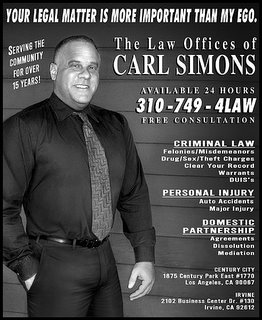THE LAW THE INTERNET AND YOU

Recently I have seen some of the most amazing things advertised for sale on the Internet. Pure and simple if activity is illegal to begin with, because the transaction takes place on the Internet does not make it magically legal. And yes these sites (be they underage porn, drugs, or advertisements for illegal services) are monitored by law enforcement.
Case in point drug sales. Whether for steroids or party drugs or prescription drugs(you buy WITHOUT A LEGAL PRESCRIPTION) you can find web sites that offer to sell all of these. The bottom line is, as the laws are written in California, the actual CRIME committed is for POSSESSION OF A CONTROLLED SUBSTNCE OR A NARCOTIC, they do not care where you got it from. Pure and simple what happens is the Feds and the Local Police work in tandem together. The Feds monitor the web site, bust them, then get their customer list. They then contact the local law enforcement for your area, and local law enforcement wait for the package to arrive.
Once you take possession of the package (and in cases I have handled, the cops simply followed the UPS or Fed Ex guy into the premises...) you can be arrested. I will be the first to say that most of the cases I have been involved with were people who had purchased more then 1 or 2 "doses" of a particular substance, but if you are buying illegal substances off the net you are subjecting yourself to arrest. Depending on the amount purchased you also may be subjecting yourself to charges either for possession or for intent to sell as well as possible Federal Crimes.
The reality is that most of these transactions do NOT get prosecuted simply because so much of this activity is going on, law enforcement can not keep up with it. However, we all take risks in life and some may not be worth more then others.
I also have seen drug sales offers take place in chat rooms, on sex web sites as well as on sites such as Craig's List. Some of these ads can be very creative. But in working with Narcotics Detectives for almost 10 years, these guys know all the lingo. My favorite ad recently advertised "1 ticket for the TINA concert for a good price." The ad went on to say that he had " 8th row seats for the best price."
Many police agencies, both local and federal now have Gay and Lesbian detectives and other employees on staff.who can easily decipher the lingo that is used in OUR community. I also know my share of Gay and Lesbian Prosecutors and Judges in the court system as well.
Additionally, offers to have sex for money is also illegal. Now offers for massage or payment for other services may not be. However, if you are offering a massage technically in some cities you may have to follow certain guidelines for the transaction to be legal. Yes, I know there are numerous web sites offering prostitution on the net. It still does not make the activity legal. The biggest problem is with these sites is that there are just so many people involved in this behavior it is impossible to enforce the laws against EVERYONE. Again this issue becomes...is it simply worth the risk of getting caught. Its no different then those going over the speed limit on the freeway, not everyone gets caught. BUT if you do, you can get yourself in a lot more trouble then just a speeding ticket.
Lastly, as more and more professions are requiring that you be licensed by the State of California; it is important to know that most licensing agencies in California will conduct their own separate investigations should you be arrested regardless if you are convicted of a crime. If you have or plan on having an occupation which requires you to have a license such as a teacher, real estate agent, nurse, doctor, dentist, etc, etc. you are subjecting yourself to these types of investigations should you be arrested. If you are under investigation by one of these boards you are entitled to an attorney and unlike a criminal court proceeding one will NOT be provided for you. In most cases it is a good idea that you have one or you may not get or keep the license you worked so hard for.
If you have questions about this or any other legal matter please do not hesitate to contact my office at (310) 749-4LAW. Additionally, I have posted most of my old articles at FREELEGALINFO4U.BLOGSPOT. COM.


